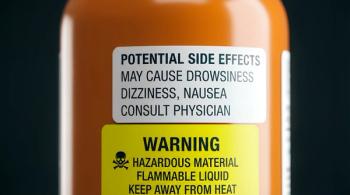
Pneumonia Risk Elevated in Patients With, Without HIV
Community-acquired pneumonia is a major cause of mortality and morbidity among patients with HIV.
Patients who are prescribed opioids are at a higher risk of developing pneumonia, according to a new examination of healthcare records of patients with and without
The research draws together a number of recent scientific findings and data points. Opioids are widely prescribed to patients with and without HIV, community-acquired pneumonia (CAP) is a major cause of mortality and morbidity among patients with HIV, and a number of
Scientists at Yale University wanted to conduct a large-scale study to see if it would affirm the apparent correlation between opioid use and pneumonia specifically.
The investigators used records from the Veterans Aging Cohort Study, a long-term study of patients who sought care in Veterans Health Administration (VA) facilities between 2000 and 2012. They found 4246 patients who had required hospitalization for community-acquired pneumonia and matched them with a cohort of 21,146 patients of similar ages, sexes, race, and HIV status.
The data showed that patients who had been prescribed medium or high doses of opioids had significantly higher rates of pneumonia, particularly if the prescribed opioid had immunosuppressive qualities. For instance, patients taking a high dose of opioids that did not have immunosuppressive qualities (or in cases where the immunosuppressive status was unknown) had an adjusted odds ratio of acquiring pneumonia of 2.07. For patients taking high doses of immunosuppressive opioids, the adjusted odds ratio was 3.18. Patients with past opioid use also had higher risks of pneumonia, though the size of the increased risk was lower.
"We saw that prescription opioids were independently associated with pneumonia requiring hospitalization," said E. Jennifer Edelman, MD, MHS, an associate professor at Yale School of Medicine, in a press release.
Edelman, the study’s corresponding author, added that the research “lends credence to the hypothesis that opioids have effects on the immune system that are clinically relevant.”
There are a number of ways opioids could be affecting the immune system. Among them, opioids can suppress the tactics a patient’s body uses to fight pneumonia infection, such as coughs, respiration, and mucus secretion, Edelman said.
When the data were stratified based on HIV status, the authors found people living with HIV (PLWH) had consistently higher risk for pneumonia when taking opioids.
“The findings from the present study, however, suggest that HIV infection may make patients more susceptible to the effects of prescribed opioids and are consistent with our findings demonstrating that PLWH have a greater mortality risk at lower opioid doses than uninfected individuals,” Edelman and colleagues wrote.
The authors said physicians should consider the correlation between opioids and pneumonia when making prescribing decisions. They added that further study is needed to find out whether strategies like shorter durations of opioid use, lower doses, or sticking to non-immunosuppressive opioids might lower the pneumonia risk.
“For now, in those settings when prescribed opioids are warranted, care should be implemented to address other risk factors (eg, smoking cessation and vaccination) known to modify CAP risk,” they concluded.
The study, “
This article was originally published by
Newsletter
Stay informed on drug updates, treatment guidelines, and pharmacy practice trends—subscribe to Pharmacy Times for weekly clinical insights.

































